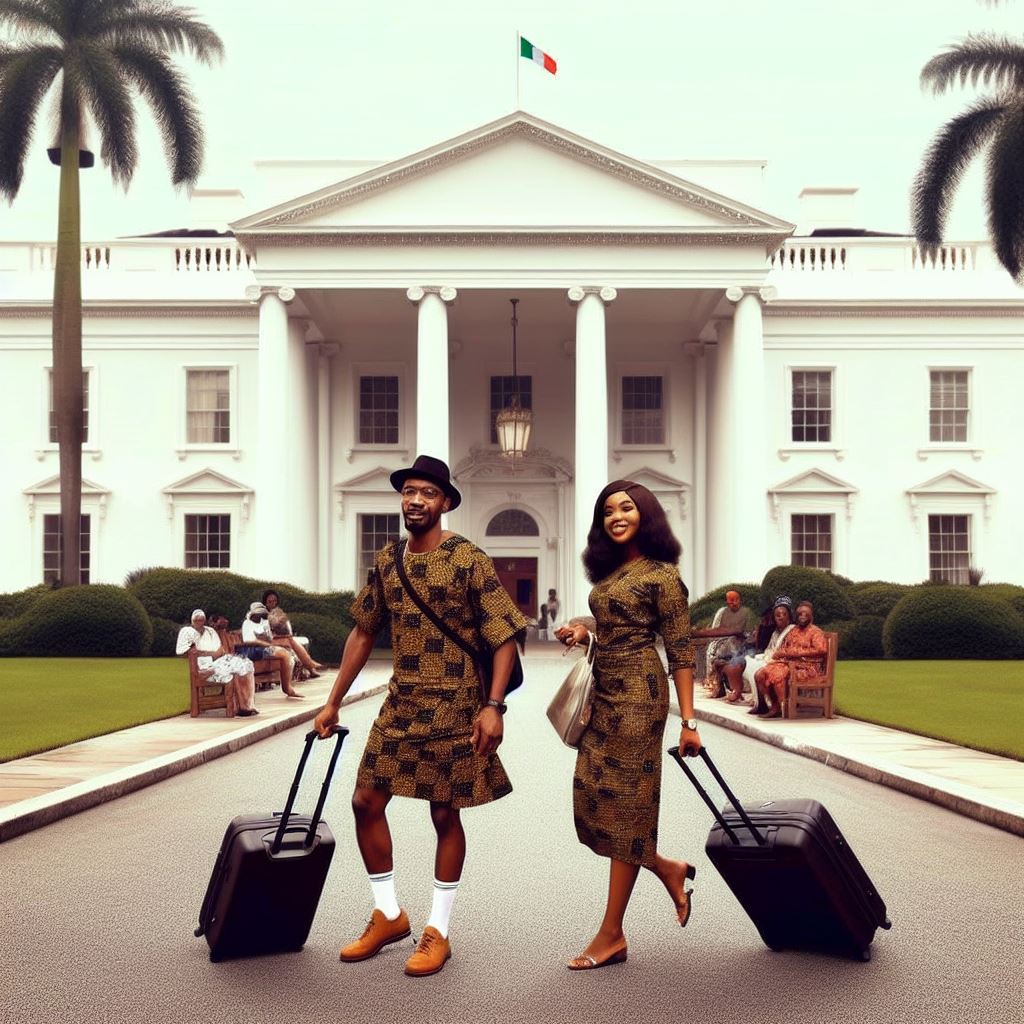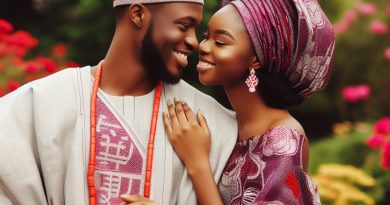True Stories: Journeys to Nigerian Citizenship by Marriage
Last Updated on January 28, 2024
Introduction
Let’s explore true stories: Journeys to Nigerian citizenship by marriage.
Nigerian citizenship by marriage is a topic that holds great importance in today’s society.
Many individuals, especially foreigners who have married Nigerians, navigate through a complex journey to obtain Nigerian citizenship.
Discussing these journeys is crucial as it sheds light on immigration procedures, legal requirements, and cultural assimilation.
Understanding the process of obtaining Nigerian citizenship through marriage is vital for individuals and their families.
It helps individuals make informed decisions, prepares them for the challenges they may face, and promotes inclusivity within Nigerian society.
The thesis statement of this section is to explore the journeys to Nigerian citizenship by marriage, highlighting the significance of this topic and providing a comprehensive understanding of the process.
By delving into the experiences and challenges faced by individuals seeking Nigerian citizenship through marriage, this section aims to provide valuable insights and information.
It is important to recognize the efforts and complexities that individuals face as they embark on this journey.
This section will discuss the legal steps involved, cultural adjustments, and the impact of obtaining Nigerian citizenship for both individuals and their families.
Through an active exploration of this topic, we hope to inform, encourage dialogue, and create awareness about the journeys to Nigerian citizenship by marriage.
Read: The Process of Applying for Nigerian Citizenship by Marriage
Background Information
Definition of Nigerian citizenship by marriage
Nigerian citizenship by marriage refers to the legal acquisition of Nigerian citizenship through marriage.
It allows foreign individuals who are married to Nigerian citizens to become citizens of Nigeria.
Legal requirements and process to obtain Nigerian citizenship through marriage
- Marriage registration: The first step is to register your marriage with the relevant Nigerian authorities. This includes submitting the necessary documents and paying the required fees.
- Residency requirement: To qualify for Nigerian citizenship by marriage, you must have lived in Nigeria for a certain period of time, usually at least three years.
- Good character and conduct: Applicants must have a good character and conduct, as determined by the Nigerian authorities. This includes having no criminal record or involvement in any unlawful activities.
- Language proficiency: You may be required to demonstrate proficiency in the English language, as it is the official language of Nigeria. This can be assessed through language tests or interviews.
- Citizenship application: Once you meet the eligibility criteria, you can submit an application for Nigerian citizenship. This involves completing the necessary forms, providing supporting documents, and paying the application fees.
- Interview and background check: As part of the process, you may be required to attend an interview with Nigerian immigration officials. They will conduct a thorough background check to verify the authenticity of your marriage and assess your eligibility for citizenship.
- Oath of allegiance: If your application is approved, you will be required to take an oath of allegiance to Nigeria. This signifies your commitment to uphold the rights, privileges, and duties of Nigerian citizenship.
Key factors to consider when embarking on this journey
- Cultural differences: Marrying a Nigerian citizen means embracing a new culture, traditions, and way of life. It is essential to be open-minded and respectful of these differences.
- Family support: Building strong relationships with your spouse’s family can greatly contribute to a smoother transition and integration into Nigerian society.
- Residency requirements: It is important to understand the residency requirements and plan accordingly. Ensure that you have the necessary documentation to prove your length of stay in Nigeria.
- Language proficiency: Acquiring basic language skills in English will not only facilitate communication but also enhance your overall experience in Nigeria.
- Legal advice: Seeking legal advice from professionals experienced in Nigerian immigration laws can help navigate the complex process and ensure compliance with all requirements.
- Patience and perseverance: Obtaining Nigerian citizenship through marriage can be a lengthy and bureaucratic process. Patience and perseverance are necessary virtues to overcome any challenges that may arise.
- Dual citizenship considerations: Before embarking on this journey, consider the implications of dual citizenship, as Nigeria does not permit dual nationality in all cases.
In fact, acquiring Nigerian citizenship through marriage entails meeting legal requirements, embracing a new culture, and considering various factors.
It is a transformative journey that requires dedication, patience, and a genuine commitment to becoming a part of Nigerian society.
Read: Busting Myths: Nigerian Marriage and Citizenship Facts
Personal Stories: Challenges Faced
Kwame and Nneka’s Journey: Dealing with cultural differences and language barriers
Kwame and Nneka’s journey to Nigerian citizenship by marriage was not without its challenges.
As a couple coming from different cultural backgrounds, they had to navigate through the complexities of blending their traditions and customs.
Adjusting to a new culture
For Kwame, being immersed in Nigerian culture was a significant adjustment.
He had to learn the language, understand the social dynamics, and adapt to new traditions.
It was a steep learning curve, but Nneka supported him every step of the way.
Communication challenges and potential solutions
Language barriers posed a real challenge for Kwame and Nneka.
While Nneka was fluent in English, Kwame struggled to communicate effectively with Nneka’s family and friends.
They enrolled in language classes together, hired a language tutor, and practiced conversing with native speakers to improve their communication skills.
Aisha El-Baz and Ibrahim: Navigating bureaucratic processes and paperwork
Aisha El-Baz and Ibrahim’s journey to Nigerian citizenship was marred with bureaucratic obstacles.
They had to navigate through layers of paperwork and legal procedures, which often felt overwhelming.
Understanding the complex legal procedures
Aisha and Ibrahim sought legal advice to comprehend the intricate processes involved in obtaining Nigerian citizenship.
They studied the requirements, prepared the necessary documents, and made sure to comply with all the legal formalities to avoid unnecessary delays.
Overcoming difficulties with documentation
Gathering the required documentation proved to be a challenging task for Aisha and Ibrahim.
Missing or incomplete paperwork led to delayed applications and frustrating setbacks.
They learned from these experiences and sought assistance from professionals to ensure all their documents were in order.
David Smith and Fadeke: Addressing societal prejudices and discrimination
David Smith and Fadeke’s journey to Nigerian citizenship was not just about legal procedures; they also had to confront societal prejudices and discrimination along the way.
Dealing with stereotypes and stigmas
Being an interracial couple, David and Fadeke faced judgment and stereotypes from both Nigerian society and their respective communities.
They struggled with societal perceptions but remained resilient, educating those around them about the power of love and acceptance.
Building support networks and finding acceptance
To combat the negative experiences, David and Fadeke actively sought out and built support networks within their communities.
They connected with other interracial couples, participated in cultural events, and engaged in volunteer work to gain acceptance and foster understanding.
Each couple faced unique challenges on their journey to Nigerian citizenship, be it cultural differences, bureaucratic hurdles, or societal prejudices.
Through their determination and perseverance, they overcame these obstacles, proving that love and commitment can transcend any barrier.
Read: The Legal Implications of Marrying for Citizenship

Success Stories: Triumphs and Benefits
Sarah Hughes: Achieving a sense of belonging and identity
- Embracing Nigerian culture and traditions
- Connecting with the local communities
Mark Evans: Gaining rights and privileges as a Nigerian citizen
- Access to social welfare services
- Employment and business opportunities
Kwame Adu: Strengthening family ties and relationships
- Establishing a deeper connection with the spouse’s family
- Raising children with dual citizenship
Tips and Recommendations
Research and seek professional advice
- Start by conducting thorough research on Nigerian marriage laws and requirements.
- Consult with immigration lawyers who specialize in Nigerian citizenship through marriage.
- Gain a clear understanding of the necessary paperwork and documentation needed for the process.
- Seek guidance from individuals who have successfully obtained Nigerian citizenship through marriage.
Learn the local language and customs
- Invest time and effort in learning the official local language spoken in Nigeria.
- Understanding the customs and traditions of Nigerian society will help smooth your integration process.
- Take language courses, hire a tutor, or use online resources to enhance your language skills.
- Immerse yourself in the local culture by participating in community events and celebrations.
Build a support network
- Connect with other foreigners who have married Nigerians to exchange experiences and advice.
- Join expatriate groups or online forums dedicated to cross-cultural marriages in Nigeria.
- Seek the support of friends and family members who understand and appreciate your journey.
- Consider finding a mentor who can provide guidance and offer valuable insights throughout the process.
Stay positive and persevere
- Obtaining Nigerian citizenship through marriage can be a complex and lengthy process.
- Stay committed to your goal and maintain a positive mindset, even during challenging times.
- Be prepared for potential setbacks and delays, but don’t let them discourage you.
- Stay organized and keep track of all necessary documents and deadlines.
- Remember that your determination and perseverance will ultimately pay off.
In brief, embarking on a journey to obtain Nigerian citizenship through marriage requires thorough research, language and cultural understanding, a strong support network, and perseverance.
By following these tips and recommendations, you can navigate the process more smoothly and increase your chances of success.
Remember, it’s a unique journey that comes with its own set of challenges, but the rewards of gaining Nigerian citizenship and embracing a new culture can be incredibly fulfilling.
Read: Marriage to a Nigerian: Steps to Secure Citizenship
Uncover the Details: Marriage is Honourable: Teaching the Next Generation its Value
Conclusion
Throughout this blog section, we explored the journey to Nigerian citizenship through marriage.
We learned about the documentation required, the legal process involved, and the challenges many face.
Obtaining Nigerian citizenship through marriage is a life-changing event for individuals seeking to build a life in Nigeria.
It provides opportunities for work, education, and a sense of belonging in the community.
For those considering this path, it is essential to research and understand the legal requirements thoroughly.
Seek guidance from professionals who specialize in immigration law to navigate the complex process.
While the journey may present challenges and obstacles, it can also be an enriching and rewarding experience.
Embrace the cultural diversity, learn the language, and immerse yourself in the vibrant Nigerian society.
Remember, determination and patience are key.
Stay focused on your goals and surround yourself with a support system. Celebrate each milestone achieved, and never hesitate to reach out for assistance when needed.
The journey to Nigerian citizenship by marriage opens doors to a new chapter in life, offering a chance for personal growth, connection, and a deeper understanding of this fascinating country.


